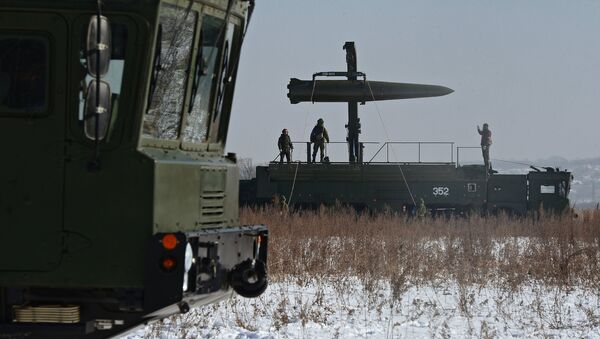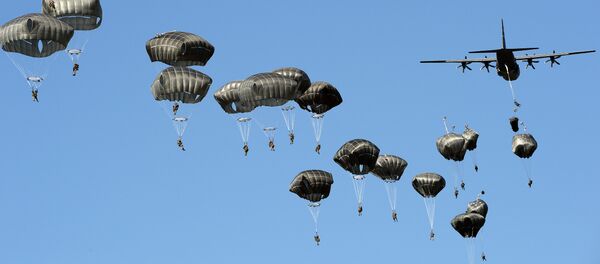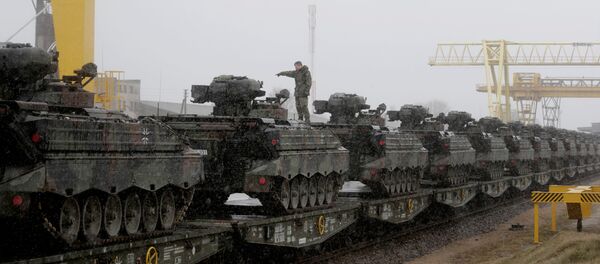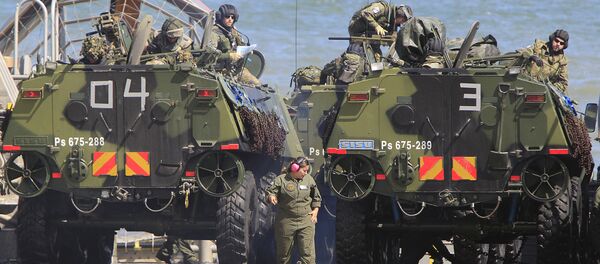Earlier this week, in an interview for Russian media on the eve of a two-day working visit to Moscow, Foreign Minister Gabriel expressed concerns over the possibility of Russia permanently deploying its Iskander-M missiles in its Baltic exclave of Kaliningrad.
Last year, Moscow confirmed that it had stationed the nuclear-capable missiles in the area for drills, and deployed an S-400 air defense system there as well.
"If Iskander missiles were stationed in Kaliningrad permanently, this would be cause for great concern, and a step back in the process to ensure European security," Gabriel said. "Therefore, we are watching what is happening in Kaliningrad very carefully," he added.
Berlin's concern is nothing new. US and European officials began complaining about the Iskanders' deployment to Kaliningrad last fall. They were met with a response from Russian Foreign Minister Sergei Lavrov, who connected their deployment to NATO's recent and ongoing buildup on Russia's borders, as well as Washington's deployment of its missile defense system in Romania and Poland.
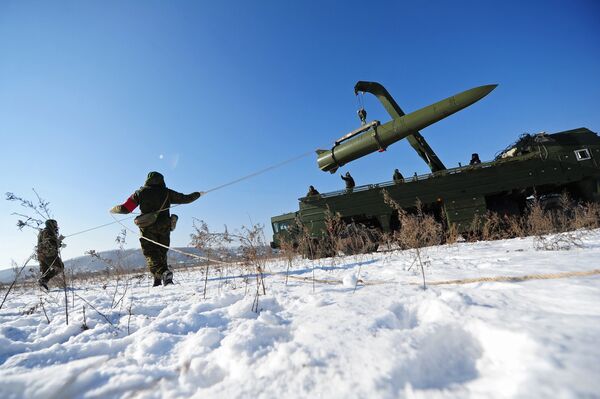
In January, presidential press secretary Dmitri Peskov offered more details on Russia's position, telling the BBC that "it is impossible to remove these missiles from Kaliningrad, not knowing whether the plans to build the anti-Russian missile system on the European continent have been abolished or not."
Over the last few years, the US and its NATO allies have gradually built up their forces in Eastern Europe to levels unprecedented since the Cold War, substantially increasing the number of drills, and deciding to permanently deploy four new multinational battalions in Estonia, Latvia, Lithuania and Poland. Germany has played an active role in that effort, with the Bundeswehr deploying several hundred troops in Lithuania at a base just 100 km from the Russian border last month.
"In comparison with these forces, the number of German military personnel [deployed to Lithuania] is practically insignificant," he added. "Germany and other NATO states were not the first to appear in the Baltic states," Gabriel suggested, pointing to 'Russian actions' in Ukraine and the supposed threat they posed to Baltic security.
Last week, in a separate interview, Gabriel made similar remarks, claiming that Russia's military buildup in the area was "completely irrational," and that the German forces would remain deployed in the Baltics for "as long as needed." The foreign minister was rebuked by Russian Deputy Foreign Minister Aleksei Meshkov, who highlighted Russia's concerns, which are also symbolic by recalling that "for the first time since the Second World War, we see German soldiers on our borders."
Indeed, as Russian military and diplomatic observers have pointed out, it's absolutely absurd for the minister to try to compare Russia's military activities within its borders to NATO's buildup in countries which border Russia after over a decade of expansion into Eastern Europe.
As has been argued by proponents of de-escalation for many years, Berlin, Washington, and other NATO powers should ask themselves how they would feel if Russia were to station troops on their borders, and then have the arrogance to complain about those countries' 'irrational military buildup'.
Russia's been put in the position of having to react to our Cold-War-style policies. Foremost: unrelenting expansion of NATO to its borders. pic.twitter.com/eVPN3JsL2g
— U.S. Dept. of Fear (@FearDept) 15 февраля 2017 г.
According to Russian defense analyst Alexei Leonkov, Foreign Minister Gabriel has "confused cause and effect" in his remarks. "The deployment of the Iskander missile systems in Kaliningrad is an entirely adequate response to NATO's eastward expansion, and to the construction of the US missile defense site in Poland," he said.
Ultimately, the expert suggested that "when tensions along the Russian border decline – i.e. when Western powers come to understand they can move their checker pieces only so far along the board, that is when changes will take place."
"In the meantime, they do not seem to hear us," Leonkov lamented. "We tell them there's no need to escalate – they respond by transferring troops and armored vehicles to our borders. US Marines take selfies with the US flag against the background of Ivangorod (a Russian town just over the border with Estonia); they behave in a provocative manner, while smiling into the camera and saying they do not threaten anyone…I don't know for whom this is meant, but we see it as a direct threat."
@realDonaldTrump @SenSchumer HOW ABOUT WE TALK MORE ABOUT WHY #NATO FORCES ARE POINTING THEIR GUNS AT #RUSSIAN BORDERS PROVOKING WAR?? pic.twitter.com/VNOLnfRDba
— Tumultuous (@BooniePirate) 3 марта 2017 г.
